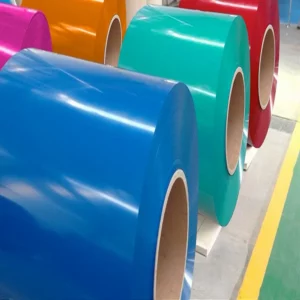| THICKNESS | 0.28 mm To 1 mm |
|---|---|
| WIDTH | 914 mm To 1220 mm |
| LENGTH | As Per Requirement |
| ALLOYS | AA 3105 / AA 3003 / AA 8011 |
| COLOR COAT TOP | Optional = RMP / SDP / SMP / PVDF / PVC = 15 To 20 Micron |
| COLOR COAT BACK | Optional = Epoxy = Light Grey Color Standard = 6 To 10 Micron |
| COIL WEIGHT | 1.5 To 2 MT |
| TENSILE STRENGTH | 250 Mpa |
| STANDARD | IS 1254: 1991 |
| CHEMICAL COMPOSITION | Test Certificate Available |
| MECHANICAL PROPERTIES | Test Certificate Available |
| BASE MATERIALS | AL / PPAL |
| FINISH | Plain Mill / Stucco Embossed / Color Coated |
| UTS | 17.5 To 19.5 kgf/mm2 |
| COLOR | Optional = White / Blue / Green / Red / Grey / Option RAL Color Chart |
| BRAND | Hindalco / Balco / Nalco / JSW /Jindal / Manaksia / Imported |
Aluminium Coil
Aluminium coil materials is designed to withstand wind forces specified in IS 875. Aluminium coil materials has a relatively high coefficient of linear expansion, 0.000024 per degree centigrade.
You haven't viewed at any of the products yet.
Related products
Email :
info@hitechindustries.co.in
phone :
+91 8000035000


